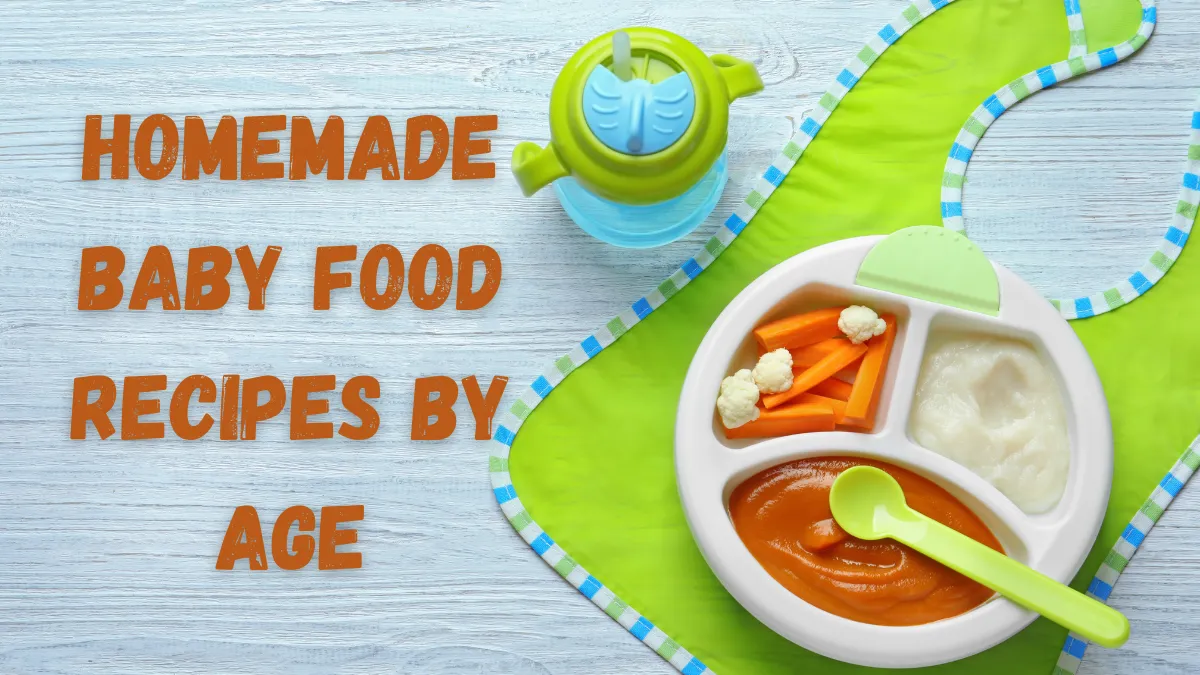Feeding your baby for the first time is a moment of joy, pride, and let’s be honest—a little bit of anxiety. You want to give your child the best start in life, and that includes healthy, nutritious food.
DIY Baby Food Recipes by Age | Healthy, Homemade Purees for 4–12 Months Babies

If you’re wondering where to begin, you’ve come to the right place. This guide answers your question right away: yes, you can make easy, healthy, and pediatrician-approved baby food at home, customized by age and stage.
In this complete beginner’s guide, you’ll learn how to prepare simple and safe meals for your baby from 4 to 12 months. From single-ingredient purees to textured finger foods, we’ll cover every age and stage with love, clarity, and confidence.
Why Choose Homemade Baby Food?
Homemade baby food gives you complete control over what goes into your baby’s body. You choose the ingredients, skip the preservatives, and avoid hidden sugars or salts. Making food at home is not only healthier but also more budget-friendly and environmentally sustainable.
What You Need to Get Started
You don’t need a fancy baby food processor or expensive kitchen gear. Here’s a simple toolkit:
- Steamer or saucepan
- Blender or hand masher
- Ice cube trays or silicone molds
- Storage containers (glass or BPA-free plastic)
- Labels for date and ingredients
Age-Wise Baby Food Chart Overview
Before we jump into recipes, let’s look at the general timeline:
| Age Range | Texture | What to Serve |
|---|---|---|
| 4–6 Months | Smooth purees | Apple, banana, sweet potato, rice cereal |
| 6–8 Months | Thicker purees | Lentils, oats, peas, spinach |
| 8–10 Months | Mashed, soft lumps | Khichdi, scrambled egg, mashed veggies |
| 10–12 Months | Soft solids, bites | Pasta, cheese, tofu, soft fruits |
Let’s explore baby food recipes by age, stage-wise and easy to make.
Baby Food Recipes for 4 to 6 Months
Your baby is just beginning solids, so start with single-ingredient purees. These should be smooth, thin, and easy to digest.
Apple Puree
- Peel and chop one apple
- Steam until soft
- Blend with a bit of breast milk or water
Banana Mash (No Cook)
- Mash a ripe banana with a fork
- Add breast milk for smoother texture if needed
Carrot Puree
- Steam chopped carrots
- Blend until smooth
- Add some water to adjust consistency
These are simple, easy baby food recipes that introduce taste and texture gently.
Baby Food Recipes for 6 to 8 Months
You can now introduce thicker purees and mix two ingredients. Iron-rich baby food becomes essential at this stage.
Sweet Potato & Lentil Puree
- Boil sweet potato and red lentils until soft
- Blend together
- Add a pinch of cumin for flavor
Oats + Apple + Cinnamon
- Cook oats in water
- Add mashed apple and a tiny dash of cinnamon
- Blend or mash as needed
Avocado & Banana
- Mash both ingredients together
- No cooking needed
This stage is ideal for introducing more nutrient-dense, homemade baby purees.
Baby Food Recipes for 8 to 10 Months
Time to explore soft lumps and simple finger foods. Your baby is learning to chew and self-feed.
Mashed Khichdi
- Cook rice and moong dal with turmeric
- Add ghee (optional)
- Mash coarsely
Scrambled Egg Yolk
- Cook egg yolk in a pan with a few drops of water
- Stir continuously for a soft texture
Mixed Veggie Mash
- Steam carrot, peas, and sweet potato
- Mash together with a little butter or olive oil
These nutritious baby food recipes are filling and introduce new textures.
Baby Food Recipes for 10 to 12 Months
Your baby can now handle soft solids. Offer bite-sized food that encourages self-feeding.
Soft Vegetable Pasta
- Cook tiny pasta shapes
- Add soft steamed vegetables
- Toss with a drop of olive oil
Paneer or Tofu Cubes
- Cut into small, chewable pieces
- Lightly steam if needed
Banana Oat Pancakes
- Mix mashed banana, oats, and egg yolk
- Pan-fry small pancakes on low heat
Stage-wise baby food at this age should support motor skill development and appetite growth.
Weekly Baby Food Meal Plan (Sample)
Here’s a basic plan for a week. Adjust portions based on your baby’s appetite.
| Day | Breakfast | Lunch | Snack |
| Mon | Banana Mash | Lentil Puree | Avocado Mash |
| Tue | Apple Puree | Oats + Fruit | Mashed Khichdi |
| Wed | Sweet Potato Puree | Rice + Veggies | Yogurt (unsweetened) |
| Thu | Pear Puree | Scrambled Egg Yolk | Fruit Cubes |
| Fri | Oatmeal + Banana | Mixed Veg Mash | Soft Cheese Cubes |
| Sat | Avocado + Banana | Pasta + Veggies | Pancakes |
| Sun | Cereal + Apple | Tofu Cubes + Rice | Mango Puree |
Storage Tips for Homemade Baby Food
Making food in batches saves time. Here’s how to store safely:
- Refrigerate: Use within 24-48 hours
- Freeze: Store in labeled trays for up to 1 month
- Thaw: In fridge or warm water, not microwave
- Avoid: Re-freezing thawed food
Common First Foods for Baby
Some great options include:
- Fruits: Apple, pear, banana, mango
- Veggies: Carrot, peas, spinach, sweet potato
- Grains: Rice, oats
- Protein: Lentils, tofu, egg yolk
These are some of the best baby food recipes to build a strong foundation.
Foods to Avoid in First Year
Safety comes first. Avoid:
- Honey (botulism risk)
- Cow’s milk (as a drink)
- Whole nuts
- Salt and sugar
- Processed foods
- Fruit juices
How to Make Baby Food at Home (Steps)
- Choose fresh ingredients
- Cook or steam thoroughly
- Puree or mash as needed
- Store safely
- Observe baby’s reaction and digestion
Feeding Baby Solids By Age
- 4–6 months: Once a day
- 6–8 months: 2-3 times a day
- 8–10 months: 3 meals + snacks
- 10–12 months: Join family mealtimes (modified food)
Conclusion
Homemade baby food doesn’t have to be complicated. With a little planning and lots of love, you can provide wholesome, flavorful meals that nourish your baby at every age. Start slow, be patient, and enjoy the process. Your baby will thank you with every happy bite!
FAQs
1. When can I start giving homemade food to my baby?
You can start between 4 to 6 months, depending on your baby’s signs of readiness and after consulting your pediatrician.
2. What foods should I avoid?
Avoid honey, cow’s milk, salt, sugar, and anything hard or a choking hazard.
3. How do I store homemade baby food safely?
Refrigerate for 1-2 days or freeze in small portions for up to a month.
4. Can I mix breast milk or formula into purees?
Yes, adding breast milk or formula can help adjust texture and boost nutrition.
5. How do I know if my baby has an allergy?
Follow the 3-day wait rule when introducing new foods to spot allergic reactions.
6. Do I need to add salt or sugar?
No. Babies’ kidneys can’t handle salt, and sugar offers no nutritional benefit.
7. Are homemade baby foods better than store-bought?
Homemade food is fresher, more nutritious, and free of additives. Plus, it’s cost-effective.
8. Can I freeze all types of baby food?
Most purees freeze well. Avoid freezing foods with high water content like watermelon or cucumber.







